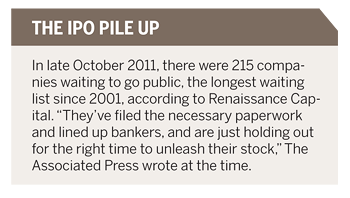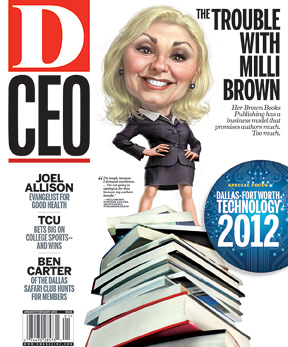In his view, a successful Internet-focused startup should:
– Become a node on the network. Connect to the Internet in some way, either as a piece of software on a server or as some sort of
appliance.
– Gather information. Take in data from the network and surrounding nodes.
– Apply logic. Figure out what the data coming in means, given the circumstances.
– Effect change and enforce policy. Make better decisions on behalf of users or customers based on location, time of day, and other factors.
“What we’re looking for is ways that that device no longer passively accepts the network connection, and forces me to look at it,” Fontenot explains. “I want that device to be a policy-enforcer, my agent on my behalf when it touches my network.”

Fontenot’s four-point checklist aptly describes a gaming company called Spawn Labs, which was bought by Grapevine-based GameStop Inc. in early 2011. Trailblazer backed Spawn Labs with a $1 million Series A investment round in 2009.
Spawn Labs, based in Austin, created a hardware and software combo that allowed gamers to play a console game remotely using nothing but a computer and an Internet connection. Fontenot calls it “Slingbox for gamers.”
Gamers saw the Spawn Labs product as a nice way to play Xbox away from home. Fontenot saw an intelligent network node between the game console and the game consumer—a new way to deliver specialized gaming content to a massive audience.
GameStop now uses Spawn Labs’ technology to allow its ‘Net-connected customers to preview games that would normally require a console. Because it’s a network application, any points accumulated or characters built during a preview follows the consumer to their console once the game is purchased.
Fontenot is fond of pointing out that Spawn Labs wasn’t a Silicon Valley darling. “I tell people all the time: we can do it in Texas at one-tenth the price and five times faster,” he say
The Wildcatter
Sitting smack between the venture capitalist and the startup entrepreneur is Gabriella Draney, co-founder of TechWildcatters. Draney is an entrepreneur who just happens to understand the venture capital business. After stints in a software startup and her own specialty-foods retail store, she realized she wanted to help others build companies and went to business school to learn about the particulars of financing companies.
With an MBA in hand, and hours logged working at local venture firms, Draney came to a realization: the “virtuous cycle” between how talented workers get from DFW’s universities to its big companies here is “somewhat broken.”

Draney, ever the entrepreneur, became a new kind of investor. Her firm helps startup entrepreneurs get to the point in their early days where they can attract investments from angel investors and institutional venture capitalists. Each spring and fall since April 2010, TechWildcatters has run a 12-week boot camp for a select few startups—usually eight to 10—out of hundreds that apply to be part of the program.
In exchange for between two and 10 percent of the startup’s founding stock, the companies selected get a small amount of funding, up to $25,000, and the opportunity to connect with corporate-development teams and VCs. Each startup selected is also paired up with mentors who invested in the TechWildcatters fund. These mentors include entrepreneurs, venture capitalists, and subject-area experts.
Silver Creek’s Adler, for example, was a mentor for Nimbix, a cloud-computing company in TechWildcatter’s spring 2011 class. Silver Creek was an investor in its seed round, and Adler says most startups as young as Nimbix need strategic and tactical advice from an outsider.
“What they need the most is a sounding board,” he says. He notes that the TechWildcatter mentor experience is “a nice way to get an early work experience with the company.”
Says Draney: “The mentors we have really put themselves on the line. They’re not only making a financial investment; they’re really making a time investment, too.”
Although the stock market continues its up and down lurches, Draney could be 2012 tech-sector optimism personified. She’s betting on this region’s long shots, the tech titans of the future, and she’s bringing the area’s biggest wallets and brightest minds along for the ride.
She’s helping entrepreneurs build startups—and building her own startup in the process. She’s helping others connect with funding sources while constantly raising money for the TechWildcatter’s fund.
Meantime she has to show a return for her investors, all while helping her mentored companies grow up and show a return for their financial backers, too. “We’re extremely capital-efficient, and that’s what we expect out of our startups,” Draney says. “So we eat our own cooking.”
TechWildcatters only looks at certain types of companies; its portfolio so far includes mostly companies embracing the two big trends of enterprise software and mobility.
The two sweet spots, in other words, for DFW start-up investors in 2012.






